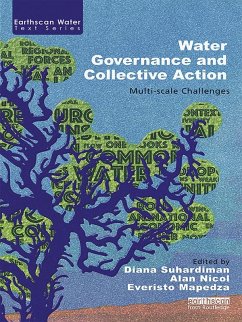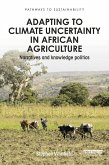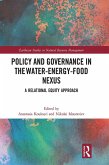Water Governance and Collective Action (eBook, PDF)
Multi-scale Challenges
Redaktion: Suhardiman, Diana; Mapedza, Everisto; Nicol, Alan
48,95 €
48,95 €
inkl. MwSt.
Sofort per Download lieferbar

24 °P sammeln
48,95 €
Als Download kaufen

48,95 €
inkl. MwSt.
Sofort per Download lieferbar

24 °P sammeln
Jetzt verschenken
Alle Infos zum eBook verschenken
48,95 €
inkl. MwSt.
Sofort per Download lieferbar
Alle Infos zum eBook verschenken

24 °P sammeln
Water Governance and Collective Action (eBook, PDF)
Multi-scale Challenges
Redaktion: Suhardiman, Diana; Mapedza, Everisto; Nicol, Alan
- Format: PDF
- Merkliste
- Auf die Merkliste
- Bewerten Bewerten
- Teilen
- Produkt teilen
- Produkterinnerung
- Produkterinnerung

Bitte loggen Sie sich zunächst in Ihr Kundenkonto ein oder registrieren Sie sich bei
bücher.de, um das eBook-Abo tolino select nutzen zu können.
Hier können Sie sich einloggen
Hier können Sie sich einloggen
Sie sind bereits eingeloggt. Klicken Sie auf 2. tolino select Abo, um fortzufahren.

Bitte loggen Sie sich zunächst in Ihr Kundenkonto ein oder registrieren Sie sich bei bücher.de, um das eBook-Abo tolino select nutzen zu können.
This book examines concepts and practices of collective action that have emerged in recent decades globally.
- Geräte: PC
- mit Kopierschutz
- eBook Hilfe
- Größe: 4.13MB
Andere Kunden interessierten sich auch für
![Water Governance and Collective Action (eBook, ePUB) Water Governance and Collective Action (eBook, ePUB)]() Water Governance and Collective Action (eBook, ePUB)48,95 €
Water Governance and Collective Action (eBook, ePUB)48,95 €![Tree Plantation Extractivism in Chile (eBook, PDF) Tree Plantation Extractivism in Chile (eBook, PDF)]() Alejandro Mora-MottaTree Plantation Extractivism in Chile (eBook, PDF)42,95 €
Alejandro Mora-MottaTree Plantation Extractivism in Chile (eBook, PDF)42,95 €![Adapting to Climate Uncertainty in African Agriculture (eBook, PDF) Adapting to Climate Uncertainty in African Agriculture (eBook, PDF)]() Stephen WhitfieldAdapting to Climate Uncertainty in African Agriculture (eBook, PDF)30,95 €
Stephen WhitfieldAdapting to Climate Uncertainty in African Agriculture (eBook, PDF)30,95 €![Voice and Participation in Global Food Politics (eBook, PDF) Voice and Participation in Global Food Politics (eBook, PDF)]() Alana MannVoice and Participation in Global Food Politics (eBook, PDF)42,95 €
Alana MannVoice and Participation in Global Food Politics (eBook, PDF)42,95 €![School Farms (eBook, PDF) School Farms (eBook, PDF)]() School Farms (eBook, PDF)39,95 €
School Farms (eBook, PDF)39,95 €![Policy and Governance in the Water-Energy-Food Nexus (eBook, PDF) Policy and Governance in the Water-Energy-Food Nexus (eBook, PDF)]() Policy and Governance in the Water-Energy-Food Nexus (eBook, PDF)42,95 €
Policy and Governance in the Water-Energy-Food Nexus (eBook, PDF)42,95 €![Nowhere To Go But Down? (eBook, PDF) Nowhere To Go But Down? (eBook, PDF)]() Andrew S. MacDonaldNowhere To Go But Down? (eBook, PDF)52,95 €
Andrew S. MacDonaldNowhere To Go But Down? (eBook, PDF)52,95 €-
-
-
This book examines concepts and practices of collective action that have emerged in recent decades globally.
Dieser Download kann aus rechtlichen Gründen nur mit Rechnungsadresse in A, B, BG, CY, CZ, D, DK, EW, E, FIN, F, GR, HR, H, IRL, I, LT, L, LR, M, NL, PL, P, R, S, SLO, SK ausgeliefert werden.
Produktdetails
- Produktdetails
- Verlag: Taylor & Francis
- Seitenzahl: 202
- Erscheinungstermin: 8. September 2017
- Englisch
- ISBN-13: 9781351705257
- Artikelnr.: 49262965
- Verlag: Taylor & Francis
- Seitenzahl: 202
- Erscheinungstermin: 8. September 2017
- Englisch
- ISBN-13: 9781351705257
- Artikelnr.: 49262965
- Herstellerkennzeichnung Die Herstellerinformationen sind derzeit nicht verfügbar.
Diana Suhardiman is a Senior Researcher and Leader of the Research Group Governance and Gender, at the International Water Management Institute (IWMI), based in Vientiane, Lao PDR. Alan Nicol is a Principal Researcher and Leader of the Strategic Program Sustainable Growth, at the International Water Management Institute (IWMI), based in Addis Ababa, Ethiopia. Everisto Mapedza is a Senior Researcher and Institutional Scientist, at the International Water Management Institute (IWMI), based in Accra, Ghana.
1. Introduction 2. Power and Politics in Water Governance: Revisiting the
Role of Collective Action in the Commons 3. The Collective is Political:
Lessons from the Nile Basin Initiative 4. Grassroots Scalar Politics in the
Peruvian Andes: Mobilising Allies to Defend Community Waters in the Upper
Pampas Watershed 5. Hydro-Hegemony or Water Security Community? Collective
Action, Cooperation and Conflict in the SADC Transboundary Security Complex
6. Place Attachment and Community Resistance: Evidence from the Cheay Areng
and Lower Sesan 2 Dams in Cambodia 7. Politics of Knowledge and Collective
Action in Health Impact Assessment in Thailand: The Experience of Khao
Hinsorn Community 8. Agricultural Water Management in Matrilineal Societies
of Malawi: Land Ownership and Implications for Collective Action 9.
Collective Action, Community and the Peasant Economy in Andean Highland
Water Control 10. Collective Action and Governance Challenges in the Tonle
Sap Great Lake, Cambodia 11. Goldmining, Dispossessing the Commons, and
Multi-Scalar Responses: The Case of Cerro de San Pedro, Mexico 12. Key
Constraints and Collective Action Challenges for Groundwater Governance in
the Eastern Gangetic Plains 13. Stakeholder Perspectives on Transboundary
Water Cooperation in the Indus River Basin 14. Reimagining South Asia:
Hopes for an Indus Basin Network 15. Structure, Agency, and Challenges for
Inclusive Water Governance at Basin Scale: Comparing Mekong with the Nile
16. Synthesis: Power, Alliances and Pathways for Collective Action
Role of Collective Action in the Commons 3. The Collective is Political:
Lessons from the Nile Basin Initiative 4. Grassroots Scalar Politics in the
Peruvian Andes: Mobilising Allies to Defend Community Waters in the Upper
Pampas Watershed 5. Hydro-Hegemony or Water Security Community? Collective
Action, Cooperation and Conflict in the SADC Transboundary Security Complex
6. Place Attachment and Community Resistance: Evidence from the Cheay Areng
and Lower Sesan 2 Dams in Cambodia 7. Politics of Knowledge and Collective
Action in Health Impact Assessment in Thailand: The Experience of Khao
Hinsorn Community 8. Agricultural Water Management in Matrilineal Societies
of Malawi: Land Ownership and Implications for Collective Action 9.
Collective Action, Community and the Peasant Economy in Andean Highland
Water Control 10. Collective Action and Governance Challenges in the Tonle
Sap Great Lake, Cambodia 11. Goldmining, Dispossessing the Commons, and
Multi-Scalar Responses: The Case of Cerro de San Pedro, Mexico 12. Key
Constraints and Collective Action Challenges for Groundwater Governance in
the Eastern Gangetic Plains 13. Stakeholder Perspectives on Transboundary
Water Cooperation in the Indus River Basin 14. Reimagining South Asia:
Hopes for an Indus Basin Network 15. Structure, Agency, and Challenges for
Inclusive Water Governance at Basin Scale: Comparing Mekong with the Nile
16. Synthesis: Power, Alliances and Pathways for Collective Action
1. Introduction 2. Power and Politics in Water Governance: Revisiting the
Role of Collective Action in the Commons 3. The Collective is Political:
Lessons from the Nile Basin Initiative 4. Grassroots Scalar Politics in the
Peruvian Andes: Mobilising Allies to Defend Community Waters in the Upper
Pampas Watershed 5. Hydro-Hegemony or Water Security Community? Collective
Action, Cooperation and Conflict in the SADC Transboundary Security Complex
6. Place Attachment and Community Resistance: Evidence from the Cheay Areng
and Lower Sesan 2 Dams in Cambodia 7. Politics of Knowledge and Collective
Action in Health Impact Assessment in Thailand: The Experience of Khao
Hinsorn Community 8. Agricultural Water Management in Matrilineal Societies
of Malawi: Land Ownership and Implications for Collective Action 9.
Collective Action, Community and the Peasant Economy in Andean Highland
Water Control 10. Collective Action and Governance Challenges in the Tonle
Sap Great Lake, Cambodia 11. Goldmining, Dispossessing the Commons, and
Multi-Scalar Responses: The Case of Cerro de San Pedro, Mexico 12. Key
Constraints and Collective Action Challenges for Groundwater Governance in
the Eastern Gangetic Plains 13. Stakeholder Perspectives on Transboundary
Water Cooperation in the Indus River Basin 14. Reimagining South Asia:
Hopes for an Indus Basin Network 15. Structure, Agency, and Challenges for
Inclusive Water Governance at Basin Scale: Comparing Mekong with the Nile
16. Synthesis: Power, Alliances and Pathways for Collective Action
Role of Collective Action in the Commons 3. The Collective is Political:
Lessons from the Nile Basin Initiative 4. Grassroots Scalar Politics in the
Peruvian Andes: Mobilising Allies to Defend Community Waters in the Upper
Pampas Watershed 5. Hydro-Hegemony or Water Security Community? Collective
Action, Cooperation and Conflict in the SADC Transboundary Security Complex
6. Place Attachment and Community Resistance: Evidence from the Cheay Areng
and Lower Sesan 2 Dams in Cambodia 7. Politics of Knowledge and Collective
Action in Health Impact Assessment in Thailand: The Experience of Khao
Hinsorn Community 8. Agricultural Water Management in Matrilineal Societies
of Malawi: Land Ownership and Implications for Collective Action 9.
Collective Action, Community and the Peasant Economy in Andean Highland
Water Control 10. Collective Action and Governance Challenges in the Tonle
Sap Great Lake, Cambodia 11. Goldmining, Dispossessing the Commons, and
Multi-Scalar Responses: The Case of Cerro de San Pedro, Mexico 12. Key
Constraints and Collective Action Challenges for Groundwater Governance in
the Eastern Gangetic Plains 13. Stakeholder Perspectives on Transboundary
Water Cooperation in the Indus River Basin 14. Reimagining South Asia:
Hopes for an Indus Basin Network 15. Structure, Agency, and Challenges for
Inclusive Water Governance at Basin Scale: Comparing Mekong with the Nile
16. Synthesis: Power, Alliances and Pathways for Collective Action







